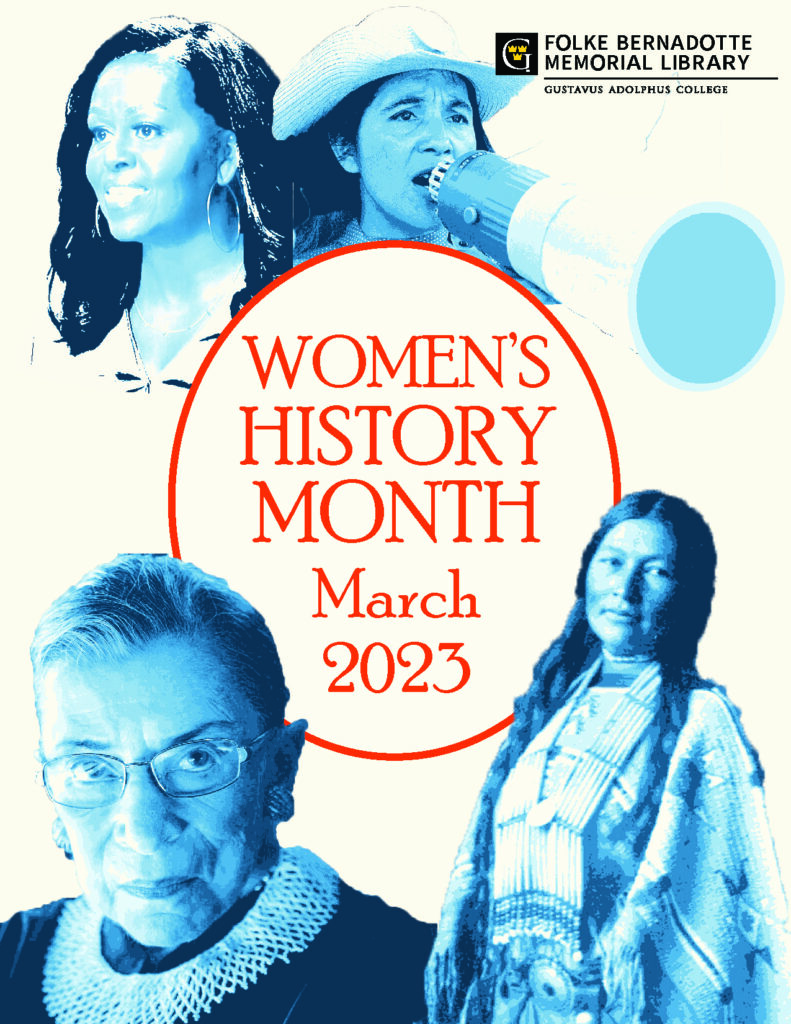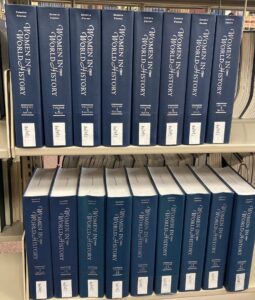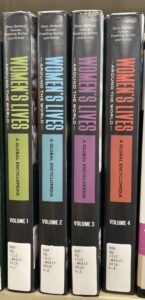Reference Collection
The reference collection on the main floor of Gustavus Library is a great first stop on your journey towards learning about any topic in women’s history. (If you don’t know where the Reference Collection is, walk straight ahead when you first enter the library. The entire column of stacks along the far wall opposite you is the Reference Collection.) Unlike books in the general collection, books in the reference collection don’t circulate and can’t be checked out — that way they’re always ready at hand for anyone in the library who wants to use them!
One fantastic reference work on women’s history is the 17-volume Women in World History (1999-2002), located at the call number HQ1115 .W6 1999 in the Reference Collection. This encyclopedia contains biographical articles for more than 10,000 women throughout history, and the last volume contains an amazing index that lets you search for women in world history by name, country, time period, and occupation. Each article contains a bibliography pointing the way to further resources about the historical woman the article is about.
If you are looking for a more narrative style reference work, we recommend the four-volume Women in American History : A Social, Political, and Cultural Encyclopedia and Document Collection (2018). This sweeping encyclopedia presents articles grouped according to historical period, presenting articles about the life of women (as well as more specific topics like Clothing and Food Production, and biographical articles about select women from each time period) starting in Precolonial North America and the Early Republic and continuing into the present.
To learn about issues affecting women in countries around the world, check out Women’s Lives Around the World : A Global Encyclopedia (2017), a four-volume encyclopedia with articles for 150 different countries. Each article provides an overview of the country it is about, along with sections on girls and teens, education, women’s health issues, employment, family life, women’s reproductive health, women in politics, religion and cultural roles for women, and other issues of power and gender equality that affect women’s lives.
More resources in the Reference Collection can be found on the Reference Works page of the Guide to Gender, Women & Sexuality Studies.
Select Collections in the General Collection
The general collection contains a number of fascinating collections of primary source texts by women authors. For example, the collection The Early Modern Englishwoman : a facsimile library of essential works, collects works both in print and manuscript by early modern English women like Anne Askew, Elizabeth Cary, Mary Sidney Herbert, and Mary Wroth. Meanwhile, the Schomburg Library of Nineteenth-Century Black Women Writers series (edited by Henry Louis Gates) gives access to a number of books by black women writers like Pauline Elizabeth Hopkins, Frances E.W. Harper, and Alice Dunbar-Nelson who have become increasingly studied by scholars of American literature. The Women in America: from colonial times to the 20th century series from Arno Press features a number of primary and secondary texts by and about American women, including texts about the history of women in the American labor movement.
One great section of the stacks to visit to learn about women’s history is HQ1101-2030.7, containing books about feminism in general and women’s lives around the world.
Anglophone Women’s Literature in America and Around the World
Anglophone women are women who write and speak in English, and who live in a wide range of countries around the world.
One great resource at Gustavus Library for celebrating the women who tell our stories from this group is on the “Peoples and Identities” subpage of Gustavus Library’s new Guide to English. On this page, you can find a guide to subject headings, reference sources, and histories of American women’s literature under the American Women Authors box. Similar resources can be found for women authors writing in English in the British and Commonwealth Women Authors box further down.
Some awards for women authors and writing about women that are indexed in the Gustavus Library catalog include the Women’s Prize for Fiction, the Janet Heidinger Kafka Prize, and the Willa Awards for Contemporary Fiction, Poetry, and Scholarly Nonfiction, named for the western American author Willa Cather. The National Women’s Studies Association annually awards two prizes, the Anzaldúa Prize and the Alison Piepmeier Book Prize, for achievement in women’s studies scholarship. In the field of speculative fiction, the Otherwise Award is given “for works of speculative fiction which explore and expand gender” (both men and women have won the award), and some additional classic works of speculative fiction can be found on the “Women” page of the Identities section of the Guide to Speculative Fiction at Gustavus Library.
If you’re looking for good books by women authors to read, you can always stop by the reference desk, email us at folke@gustavus.edu, or use our online Chat service to get a book recommendation from a librarian! (Also check this space in August, when we’ll be celebrating some non-Anglophone women authors during Women in Translation Month.)


